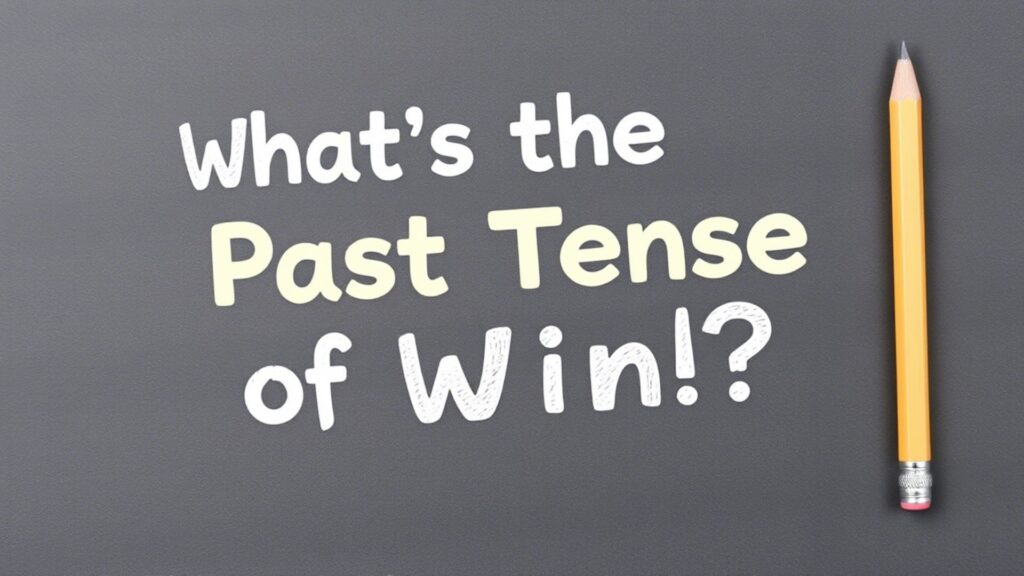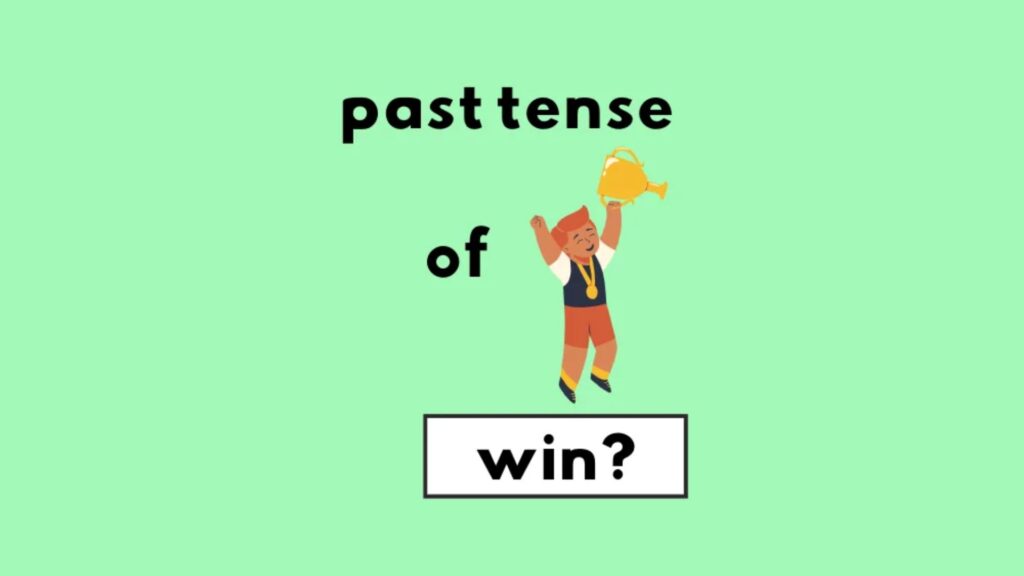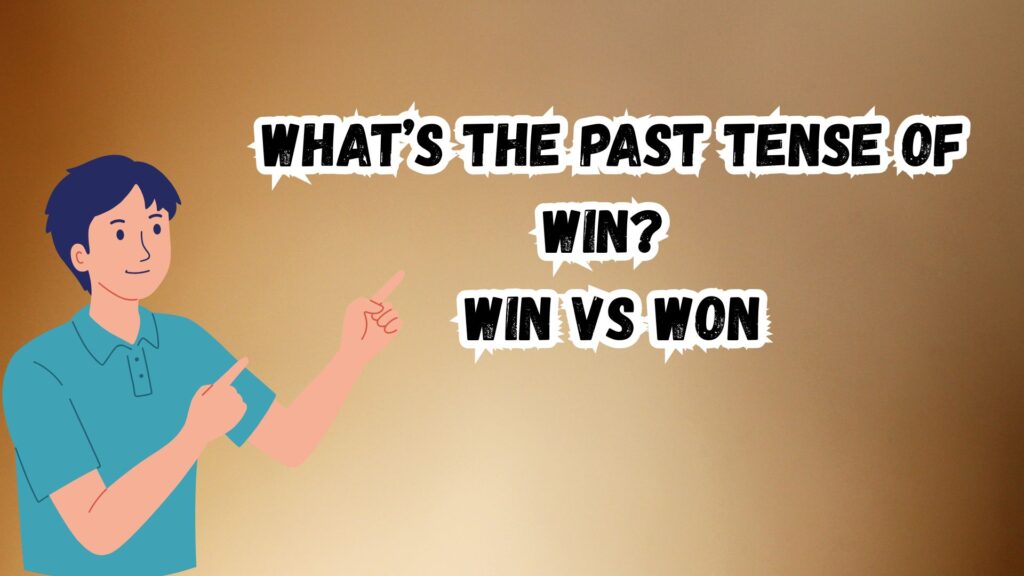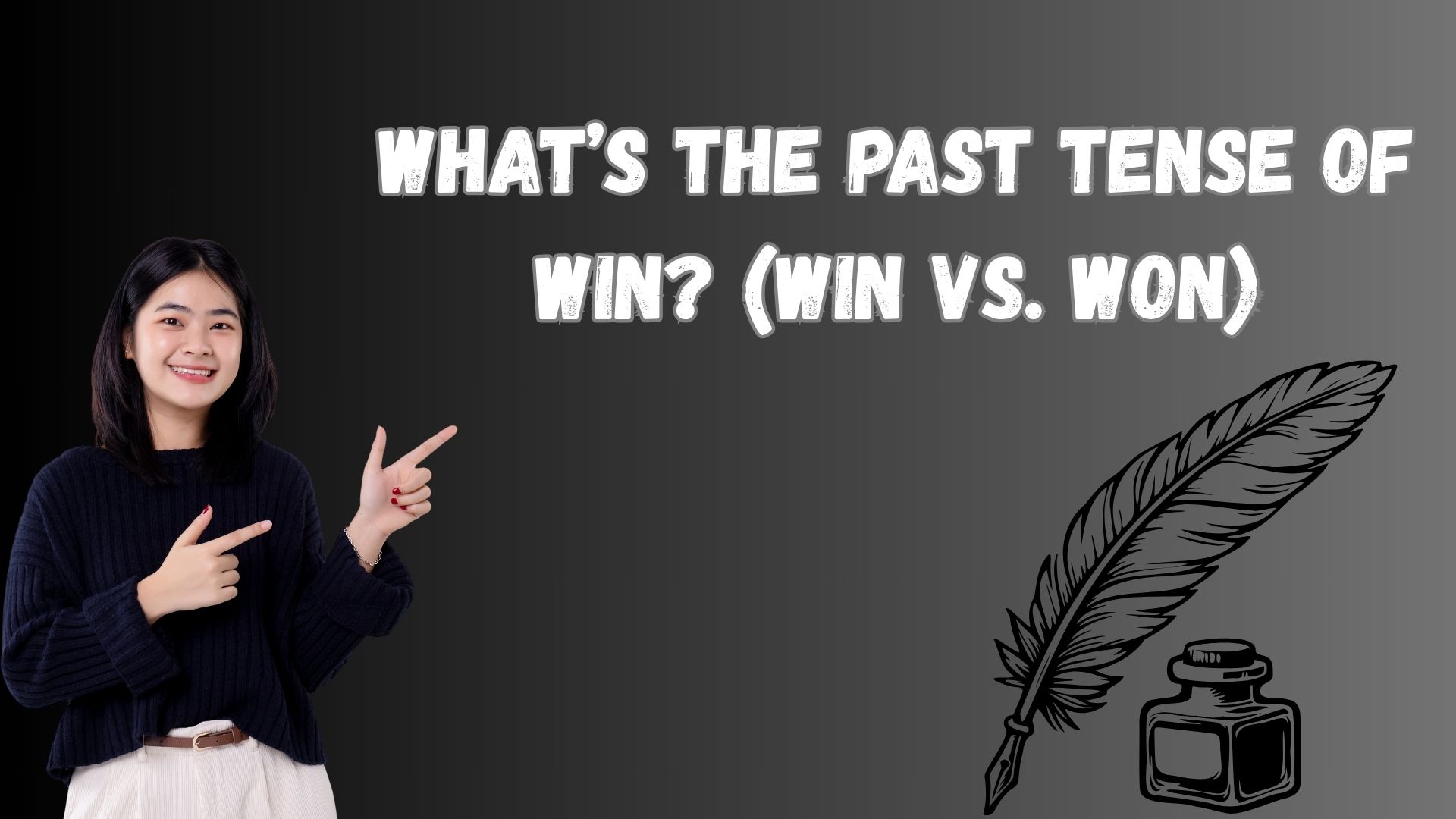You’ve heard it shouted in stadiums, scribbled on scoreboards, and toasted over drinks: “We won!” But how exactly does the verb win work when it comes to tense? If you’re wondering about the difference between win and won, or you’re unsure when to use have won vs. won, you’re not alone.
Let’s break it down in plain English with examples, scenarios, and even a few idioms that’ll stick with you longer than last night’s highlights reel.
📌 What Is the Past Tense of Win?

The past tense of win is “won.”
It’s an irregular verb, which means it doesn’t follow the usual pattern of adding -ed at the end like “walked” or “played.”
| Base Form | Past Simple | Past Participle |
|---|---|---|
| win | won | won |
So, unlike regular verbs, there’s no “winned” in standard English. It’s simply:
- I win today.
- I won yesterday.
- I have won many times.
💡 Example 1: A Simple Past Email
Subject: We Won the Pitch!
Hey Michael,
Just wanted to share some great news we won the bid for the Stanford project! The team really pulled through. Let’s catch up Monday to go over next steps.
Cheers,
Eric
📝 Explanation: The verb won here is used in simple past tense. The event already happened. It’s finished.
🧠 The Role of Won as a Past Participle
The word won also acts as the past participle of win. This is used in perfect tenses when paired with a helping verb like has, have, or had.
✅ Present Perfect:
She has won three gold medals so far.
✅ Past Perfect:
By the time I arrived, the team had already won.
✅ Future Perfect:
By next year, they will have won six championships.
💬 Example 2: Business Report Sentence
“As of Q4, the marketing department has won multiple industry awards, solidifying its reputation as a leader in brand strategy.”
This is present perfect tense, used to show that something happened at an unspecified time before now but is still relevant.
🏆 Common Usage Idioms with Win

Sprinkling in idioms? It’s a great way to sound more natural in English, especially in conversation.
Here are a few that use win or won:
- You win some, you lose some – Life is full of ups and downs.
- Win by a landslide – To win by a huge margin (often used in elections).
- Can’t win ’em all – A casual way to express that failure is sometimes inevitable.
- The house always wins – Refers to casinos (or systems) having the upper hand.
- In it to win it – You’re committed to succeeding.
- Slow and steady wins the race – Patience and consistency beat rushing.
✅ Try this in context:
“Even though we didn’t get the contract, hey you win some, you lose some.”
📜 A Quick Peek at Etymology
Ever wonder where win comes from? The word traces back to Old English “winnan”, meaning to strive, to labor, or to gain through effort. It shares roots with the concept of struggle, which makes sense victory doesn’t usually come easy.
The original term implied strife or effort, which evolved into our modern sense of victory or gain.
🧾 Verb Comparisons: Irregular Patterns
Some verbs share similar patterns with win. Check out this quick comparison:
| Base Verb | Past Tense | Past Participle |
|---|---|---|
| win | won | won |
| spit | spat | spat |
| sit | sat | sat |
| tell | told | told |
| shoot | shot | shot |
| lose | lost | lost |
💡Pro tip: These verbs don’t take -ed. If you see “winned,” “shooted,” or “telt,” you’re likely looking at a typo or a joke.
✉️ Example 3: Feedback Message Using Past Perfect
“By the time the judges announced the results, Olivia had already won the regional championship. Her choreography stood out from the rest.”
Here, the phrase had already won uses past perfect tense, emphasizing that the winning occurred before another past event.
🕓 Timeline of Tense: Win Through Time
Let’s map it visually for clarity:
PAST NOW FUTURE
|---------------------|----------------------|
I won → I have won → I will win
I had won → I will have won
📚 Real World Examples: Sports & Media
- “The Raptors won the game last night.”
- “Have the Yankees won this season yet?”
- “She has won five Grammys.”
- “The World Cup was won by Spain in 2010.”
- “He was winning until the final round.”
Each of these sentences uses a different tense or form of win, showcasing its flexibility.
🔄 Confusion Point: Win vs. Won

People often mix these up in speech or writing. Here’s a simple trick:
If you’re talking about something in the past and without a helping verb (have/has/had), use won.
❌ Incorrect:
We have win the award.
✅ Correct:
We have won the award.
❌ Incorrect:
I win the game yesterday.
✅ Correct:
I won the game yesterday.
💼 Email Scenario: Client Update
Subject: Update on the Bidding Process
Hi Sarah,
Just wanted to give you a heads-up we won the bid for the Toronto expansion. That puts us ahead of schedule for Q3 deliverables.
Let’s touch base Thursday to talk about execution timelines.
Best,
Daniel
Here, won is used in the simple past a direct report of a completed action.
📊 Grammar Snapshot: Verb Tense Chart
| Tense | Example with “Win” | Explanation |
|---|---|---|
| Present | I win. | Regular or habitual action |
| Past | I won. | Completed action |
| Future | I will win. | Action to happen |
| Present Perfect | I have won. | Action relevant to the present |
| Past Perfect | I had won. | Completed before another past action |
| Future Perfect | I will have won. | Will be complete before another future event |
| Present Continuous | I am winning. | Ongoing action |
| Past Continuous | I was winning. | Ongoing past action |
| Present Perfect Continuous | I have been winning. | Ongoing action with relevance to now |
✅ Summary Takeaways
- Won is both the past tense and past participle of win.
- Use won when talking about something that already happened.
- Combine won with has/have/had to form perfect tenses.
- Avoid using “winned” it’s not standard.
- Learn the idioms! They make your English sound natural and fluent.
If you’re in it to win it, now you’ve got the grammar chops to back it up. Whether it’s a game, a job interview, or a conversation you’ve already won by knowing how to say it right.

